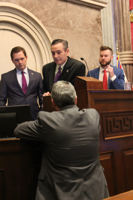This story is a partnership between the Nashville Banner and the Nashville Scene. The Nashville Banner is a nonprofit, nonpartisan news organization focused on civic news. Visit nashvillebanner.com for more information.
After a three-week trial watched intensely by Tennessee’s political establishment, former Tennessee Speaker of the House Glen Casada and his former chief of staff Cade Cothren were found guilty of honest services wire fraud, conspiracy, bribery, theft and money laundering on Friday.
U.S. makes a straightforward case that the duo defrauded the government through mailing company
The jury’s verdict came in around noon on the fourth day of deliberations. Cothren was found guilty on all 19 counts, while Casada managed to get off on two of the 19 counts. Honest services wire fraud carries a maximum sentence of 20 years.
“Obviously, we felt very strongly about our case,” Casada’s attorney Ed Yarbrough told reporters in the hallway after the proceedings. “We’re disappointed with the verdict, and there will be an appeal.”
Cothren’s attorney Cyntha Sherwood confirmed that they will “absolutely” appeal the ruling.
Sentencing is scheduled for Sept. 12. Judge Eli Richardson ruled that neither man is a flight risk or a danger, and they will be allowed to remain free until their sentencing.
House Speaker Glen Casada's wildly overpaid chief of staff, Cade Cothren, resigned Monday evening after confessing to the ultimate political c…
Casada resigned from his role as speaker of the House almost exactly six years ago, about two weeks after Cothren had resigned as his chief of staff. While leaked racist and misogynistic texts between the two were what triggered their resignations, the lead-up included a representative alleging that Casada attempted to bribe him for his vote on a school voucher bill, Cothren admitting to using cocaine in his office, and allegations of bribery, bugging the state office building and overuse of the state plane swirling around Casada.
But it was the actions they took following their resignations that ultimately led to an even greater downfall. Here’s how it happened.
The Scheme
On a warm October evening in 2019, Casada, Cothren and former Rep. Robin Smith were seated in a booth in the back of the since-closed Ainsworth bar in Midtown. Just a few months prior, leaked text messages led to Cothren's resignation as Casada’s top aide.
Smith — who pleaded guilty on one count of honest services wire fraud and is set to be sentenced after this trial — testified that for months following Cothren’s departure, she had been helping him find work — just odd jobs here and there, nothing sustainable. The topic of that night in October? How to make some real money.
The trio knew that no one would want to work with a company run by Cothren if they knew he was behind it. He was “radioactive,” as Smith put it. In an audio recording of an interview with Casada from the day the FBI raided his home in January 2021, Casada — in a clip that was supposed to be redacted and caused the defense to make a failed motion for a mistrial — was heard saying, “Cameron [Sexton], who’s speaker of the House, said he doesn’t like Cade, and Cade felt that if they knew he was behind [Phoenix Solutions], they wouldn’t approve it. And I think he was right.”
So they hatched a plot: Cothren would start a New Mexico LLC under the alias Matthew Phoenix, a reference to a Phoenix rising from the ashes, which Smith said she had read about in the Bible. That’s how Phoenix Solutions, a political consultancy firm with Cothren covertly at the helm, was born.
According to Smith’s testimony and texts between the three introduced as evidence, the plan was simple: Smith and Casada, both still active members of the Tennessee House, would use their positions to direct business toward Cothren working as Phoenix Solutions. In return, they would each get a cut of any business they brought in. But there was a problem. Ultimately, they wanted to get campaign and caucus work from members of the House, but in order to do that, they first needed a portfolio of work Phoenix Solutions had already done to show.
That’s how they decided to take aim at what Smith called the “low-hanging fruit” of constituency mailers. Every member of the Tennessee House receives $3,000 in taxpayer dollars a year to use on non-political mailers to inform their constituents of what’s going on at the Capitol. While there are guidelines on the content and when they are sent out that prohibit the mailers from being used for campaigning purposes, representatives often send the mailers at times that are convenient for their reelection, giving them free visibility paid for by the taxpayers.
Right from the jump, business was booming. According to Smith, most representatives did not typically utilize their postage and printing allowances, and many didn’t even know about it. So when they were approached by Smith or Casada with an offer of doing these mailers for them, they were more than willing.
Former aide Cade Cothren was identified as the fictional ‘Matthew Phoenix’ at the center of the consulting scheme
Former Rep. Patsy Hazelwood (R-Signal Mountain), state Rep. Esther Helton-Hayes (R-East Ridge) and state Rep. Jay Reedy (R-Erin) all testified that they unknowingly used Phoenix Solutions for mailers in late 2019, and would not have felt comfortable doing business with a company run by Cothren due to his scandalous exit from the House following the disclosure of racist texts and illegal drug use.
“In my mind, it was a very corrupt way of doing business,” Reedy said. “When I became aware of what was going on, it was appalling.”
In just a few months, Cothren, Casada and Smith already had more than a dozen clients. Business was good, but there was a problem: They were not receiving any checks for the work they were doing.
Problems With the Legislature
When the state received invoices for the Phoenix Solutions for mailers printed for Reedy and Smith, payments were not immediately made because the company was not yet an approved vendor, and the state did not have the required W-9 paperwork on file. Smith reached out to then-director of the Office of Legislative Administration Connie Ridley inquiring about the delay, which Ridley said she found unusual — she was unaware of any business connection between Smith and Phoenix Solutions, and representatives typically didn’t get involved in the payment process. Ridley testified that Smith went so far as to tell her that the delay in payment was a “poor reflection on the state of Tennessee.”
When Ridley finally received the W-9, it was signed by Matthew Phoenix, later discovered to be Cothren’s alias. Payments began to go out to Phoenix Solutions, along with Smith's and Casada’s companies, River’s Edge Alliance and RightWay Consulting. All in all, the three netted about $52,000 in taxpayer money from doing constituency mailer work.
Ex-Speaker Glen Casada arrested, faces October trial alongside top aide Cade Cothren
Ridley testified that it was not until May 2020 that she discovered who was actually behind Phoenix Solutions.
“There were some questions as to whose company Phoenix Solutions was, and our office requested copies of the canceled checks issued to Phoenix Solutions to see if we could identify who was signing those checks,” Ridley said.
“Who was signing?” U.S. Attorney John Taddei asked.
“Cade Cothren,” Ridley said.
The defense argued that it did not matter if Ridley and the speaker’s office knew who was behind Phoenix Solutions, because under the postage and printing allowance policies, they did not actually have the power to approve or deny a vendor based on whether or not they “liked” someone. To take it further, attorneys for Cothren and Casada argued that everything that went down was “business as usual” at the Capitol, all the result of a political rivalry between Casada and his successor, Sexton.
While Sexton was anticipated as a star witness in the trial, he never actually made it to the witness stand. From the beginning, the defense pointed to Sexton meeting with the FBI multiple times, all the way back to 2020, going so far as to accuse him of working with the FBI to take down his political rival.
Early in the morning on Jan. 8, 2021, Casada, wearing a bathrobe, answered a knock at the door of his Williamson County condo. It was the FBI. Agents raided both his and Cothren’s homes, along with those of Smith and Rep. Todd Warner (R-Chapel Hill).
A little over a year later, Casada and Cothren were indicted.
“They’ve taken these payments and twisted them to fit a federal statute,” Yarbrough argued in closing, attempting to paint the business conducted at Phoenix Solutions as perfectly legitimate.
The jury was unconvinced.
Notebook
- GOP REACTION: "Today’s verdict reaffirms the principle that public office is a sacred trust, not a license for personal gain or abuse of power,” reads a statement from Casada’s former caucus after the verdict. “The House Republican Caucus deeply appreciates the leadership of House Speaker Cameron Sexton, who was instrumental in uncovering illegal activity by two former members and providing critical facts to federal authorities."
- DEMOCRATIC REACTION: “Nobody thinks this trial is delivering justice,” says Rachel Campbell, chair of the state Democratic Party. “Our lawmakers are out of control. Authoritarianism breeds corruption. They go hand in hand. Throughout this trial, we heard that lawmakers feel entitled to spend public money to enrich themselves in their power struggles. We heard that votes can be bought and sold. Tennesseans saw how the game is played, and Republicans are running our state like a cartel.”
- SLOW TRIAL: Just a couple of days into the proceeding, federal prosecutor Taylor Phillips told Richardson they were behind schedule. The main issue was a disagreement over evidence related to campaign and caucus work that Phoenix Solutions did for House members. While that work brought in far more money — about $200,000 — it was not taxpayer money, and it was not a part of the indictment. So every time evidence was introduced related to that work, the defense objected, which resulted in multiple lengthy sidebars. Finally, after arguments from the prosecution that the more profitable campaign and caucus work was a motive for the co-conspirators to obtain the constituency mailer work, Richardson overruled the defense’s objections and said they would be preserved in case of an appeal.
- EXTRA COPY?: While the courtroom was largely silent and well-behaved, there was one notable scene during the questioning of Smith, when Sherwood asked her what conversations she’d had with her attorneys. While Judge Richardson prohibited that line of questioning, he did allow Sherwood to ask yes or no questions about whether or not Smith had discussed certain things with her attorney. But Smith, who was long-winded in all of her answers, had trouble with this instruction, causing panic among her attorneys, seated in the gallery. Their agitation was significant enough that Sherwood attempted to subpoena Smith’s lead counsel, Ben Rose, who she believed was making signals to Smith throughout her testimony. And while a healthy debate began the next day over whether Sherwood was allowed to subpoena a witness's attorney, it was eventually discovered that she had only made one copy of the subpoena, and had to ask for it back after serving Rose, which meant he was never properly served.
- SOBBING JUROR: Sherwood told Judge Richardson that she noticed Juror No. 3 crying during the verdict, something confirmed by Assistant U.S. Attorney Taylor Phillips. Each juror affirmed the verdict when they were polled individually by Richardson.
This article first appeared on Nashville Banner and is republished here under a Creative Commons Attribution-NoDerivatives 4.0 International License.









